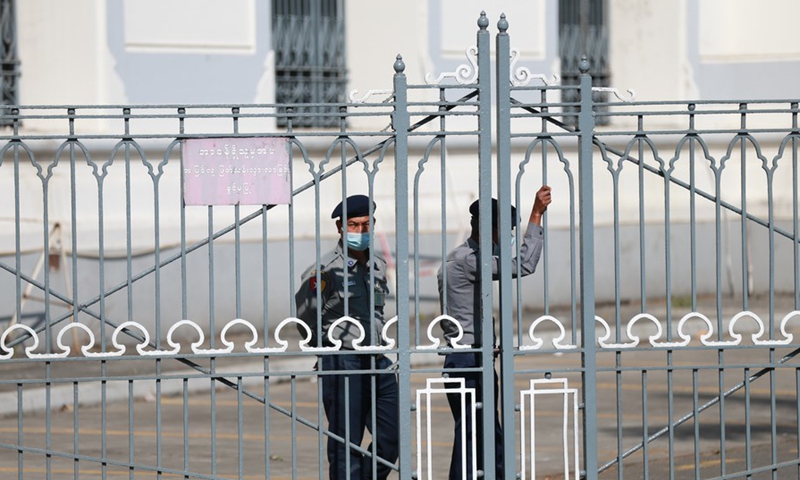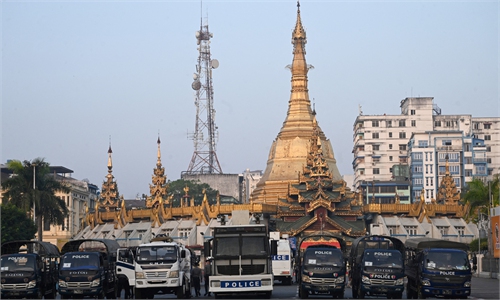As Myanmar situation intensifies, Western countries urged to avoid adding fuel to fire

Security guards are seen at the entrance of the City Hall in Yangon, Myanmar, Feb. 2, 2021. (Xinhua/Zhang Dongqiang)
As the situation intensifies in Myanmar, which is bracing for the largest anti-coup protest yet after bloody clashes, Chinese observers urged outside countries, such as the US, to stop "pouring oil on the fire," and encouraged ASEAN to play a coordinating role in easing the turbulence.
Myanmar's protesters plan to hold their largest mass rally yet on Monday, after two demonstrators were shot dead last weekend, Bloomberg reported.
Shops and businesses are expected to close in solidarity, with the nation's largest retailer, City Mart, announcing it will shut all of its outlets.
Myanmar has been struck by nationwide demonstrations since the military seized control of the country on February 1, with no sign of an easing of tensions in sight, as Chinese observers warned that Myanmar faces many uncertainties ahead.
A spokesperson for China's Foreign Ministry said on Monday that as a friendly neighbor of Myanmar, China hopes all sides will remain restrained for the good of the country's development and stability, and resolve discrepancies under the framework of the law and constitution.
In phone calls with Brunei's Second Minister of Foreign Affairs Haji Erywan and Indonesia's Foreign Minister Retno Marsudi, Chinese State Councilor and Foreign Minister Wang Yi said that "China supports ASEAN in championing the principle of non-interference in internal affairs and consensus building, playing an active role in the ASEAN Way, and having engagement and communication with Myanmar as early as possible."
"China supports ASEAN in holding a special meeting of foreign ministers and believes ASEAN, as a mature regional organization, can help Myanmar tide over difficulties with its political wisdom," according to Wang.
"How long will the protests last? Is the military capable of bringing the situation under control? And what will be the result of the trial of Myanmar State Counselor Aung San Suu Kyi? Those are all factors that will affect the situation in Myanmar," said Xu Liping, director of the Center for Southeast Asian Studies at the Chinese Academy of Social Sciences in Beijing.
Apart from the internal factors, certain outside countries, with the US being the most vocal, have constantly made what Xu called "stimulating messages and moves" to add fuel to the fire of the Myanmar situation.
The US will keep up "firm action" against Myanmar authorities, US Secretary of State Antony Blinken tweeted on Sunday, after the deaths of the two protesters.
Previously, US President Joe Biden approved sanctions against the Myanmar junta, including the defense minister and three companies in the jade and gems sector. Following the US suit, both the UK and Canada announced relevant measures last week.
"The Western sanctions are not helping cool the current turbulence in Myanmar, or bring together all parties involved in the power transition to hold constructive dialogue… Also, those measures have very limited effects, as they are just repeating old tricks against the military after the Rohingya issue," according to Xu.
Apart from pressuring Myanmar, certain Western forces have also tried to sling mud at China and sabotage China-Myanmar ties through this power transition. A report published by Justice for Myanmar, an activist organization, said five Chinese companies had provided munitions to the country. This report was soon interpreted by several overseas anti-China media outlets as "evidence of China's support for the junta."
Xu said that the claims are aimed at inciting hatred towards China within Myanmar and hurting China-Myanmar ties. Also, he said they are aimed at putting pressure on China to get involved in Myanmar's situation, "but China won't take the bait, as we wish nothing but a peaceful and stable Myanmar. China won't take sides or interfere with other countries' domestic affairs."
Xu said that an ASEAN initiated meeting could provide a dialogue platform for all parties in Myanmar and help ease the situation in the country. "If they really care about Myanmar's future, those outside countries should give constructive suggestions, instead of stimulating the situation. We must respect the choice of the Myanmar people."


